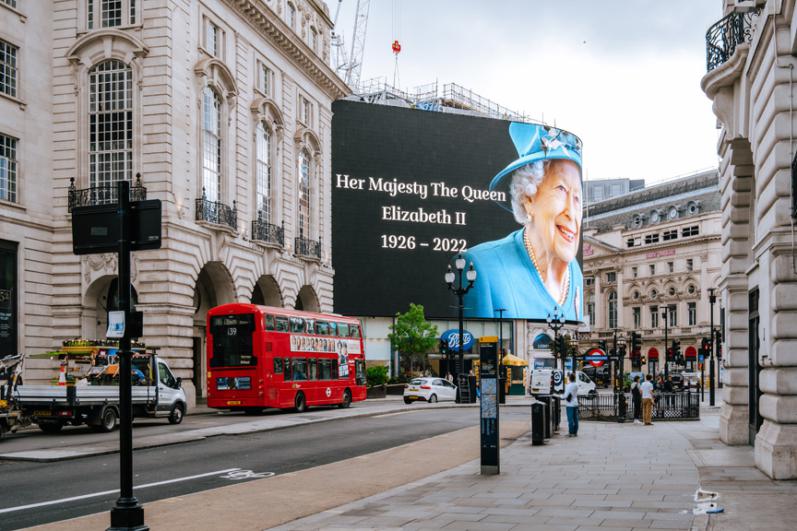Queen Elizabeth II: Faithful disciple
I was in Rome last week to give a presentation to the Pontifical Academy of the Sciences. Perhaps at a later date I will share some of what I taught and learned at that conference. I was supposed to go the following week with my Word on Fire team to England for a series of talks and events. But midway through the Roman part of the journey, word came to us that Queen Elizabeth II had died. We immediately made the decision to postpone the England trip to a later time. But I've been thinking a good deal about the Queen during these days, especially as I have taken in the marvelous pageantry around her funeral exercises. I agree with the army of pundits and commentators who have praised Elizabeth for her steadfastness, devotion to duty, sangfroid in the face of trials, and love of country. But I should like to draw special attention to a dimension of her life too often overlooked -- namely, her unapologetically Christian faith.
Perhaps it is not as well known today as it once was, but the monarch of Great Britain is not simply a political and cultural figure but clearly a religious one as well. During Queen Elizabeth's coronation ceremony in 1953, the new ruler was presented with scepter, orb, ring, and crown, each one of which was emblazoned with the cross, symbolizing Christ's lordship over the world. And though she was surrounded during that ceremony with the crown jewels, she received a Bible which was described as follows: "the most valuable thing that this world affords." The most sacred moment of the coronation was the anointing, during which Elizabeth, stripped of royal insignia and wearing only a simple white dress, was anointed with chrism by the Archbishop of Canterbury, who prayed that the Holy Spirit would set her apart for service. Of course, by means of this sacred ceremony, Elizabeth became, not simply head of state, but also head of the Church of England. Just days before her coronation, she made this moving request to everyone in the British Commonwealth: "I want to ask you all, whatever your religion may be, to pray for me on that day -- to pray that God may give me wisdom and strength to carry out the solemn promises I shall be making, and that I may faithfully serve Him and you, all the days of my life."
That she took this identity and its obligations seriously is evident to anyone who looks objectively at her life. At a time when many Christians fell away from the practice of their faith, Queen Elizabeth remained, throughout her reign, a weekly churchgoer. Moreover, she took special joy in listening to fine Christian preaching, including that of Billy Graham, with whom she maintained a decades-long friendship. In her annual Christmas addresses to the nation, the Queen showed herself to be, in her own right, a fine evangelist, declaring her faith, not simply in God, but also in Christ Jesus. In the millennial year of 2000, she said, "To many of us, our beliefs are of fundamental importance. For me, the teachings of Christ and my own personal accountability before God provide a framework in which I try to live my life. I like so many of you have drawn great comfort from Christ's words and example." In the Christmas address of 2008, she said, "I hope that, like me, you will be comforted by the example of Jesus of Nazareth who, often in circumstances of great adversity, managed to live an outgoing, unselfish, and sacrificial life." And in 2012, she preached, "This is the time of year when we remember that God sent his only Son to serve and not to be served."
That these were not simply fine words that the Queen spoke on solemn occasions becomes clear when we attend to some of the remarkably Christian gestures that she made throughout her reign. Perhaps the most extraordinary was the simple handshake she offered to Martin McGuinness, head of Sinn Féin, an organization at the time closely connected to the Irish Republican Army. The IRA had been responsible for the assassination of Prince Philip's uncle, Lord Mountbatten, a close confidant to Prince Charles and a friend to the entire royal family. How easy it would have been for the Queen to speak words of condemnation or, at the very least, to have ignored this Irish official. In point of fact, many argue that her offer of forgiveness helped enormously to heal tensions within Irish society and between the Irish and the British. On a much smaller scale, but in a manner touching in its simplicity, the Queen commented on the infamous and embarrassing interview that Prince Harry and Meghan Markle gave to Oprah Winfrey. When asked her reaction, she said, "Harry, Meghan, and Archie will always be much-loved family members." Once again, forgiveness rather than retribution was paramount in her mind.
And so I am happy to honor Elizabeth II as the longest-serving monarch in British history, as the anchor for her country during turbulent times, and as the Queen who presided over the peaceful transition from the British Empire to the British Commonwealth. But I am especially pleased to honor her as an evangelist, and a faithful and unpretentious disciple of her Lord.
- Bishop Robert Barron is the founder of the global ministry, Word on Fire, and is an Auxiliary Bishop in the Archdiocese of Los Angeles.



















